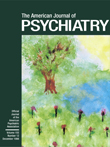Major Depression in Individuals With a History of Childhood Physical or Sexual Abuse: Relationship to Neurovegetative Features, Mania, and Gender
Abstract
Objective:Numerous studies have linked childhood trauma with depressive symptoms over the life span. However, it is not known whether particular neurovegetative symptom clusters or affective disorders are more closely linked with early abuse than are others. In a large community sample from Ontario, the authors examined whether a history of physical or sexual abuse in childhood was associated with particular neurovegetative symptom clusters of depression, with mania, or with both.Method:The World Health Organization Composite International Diagnostic Interview was used to assess 8,116 individuals aged 15–64 years. Each subject was asked about early physical and sexual abuse experiences on a structured supplement to the interview. Six hundred fifty-three cases of major depression were identified. Rates of physical and sexual abuse in depressive subgroups defined by typical and reversed neurovegetative symptom clusters (i.e., decreased appetite, weight loss, and insomnia versus increased appetite, weight gain, and hypersomnia, respectively) and by the presence or absence of lifetime mania were compared by gender.Results:A history of physical or sexual abuse in childhood was associated with major depression with reversed neurovegetative features, whether or not manic subjects were included in the analysis. A strong relationship between mania and childhood physical abuse was found. Across analyses there was a significant main effect of female gender on risk of early sexual abuse; however, none of the group-by-gender interactions predicted early abuse.Conclusions:These results suggest an association between early traumatic experiences and particular symptom clusters of depression, mania, or both in adults. Am J Psychiatry 1998; 155: 1746-1752



